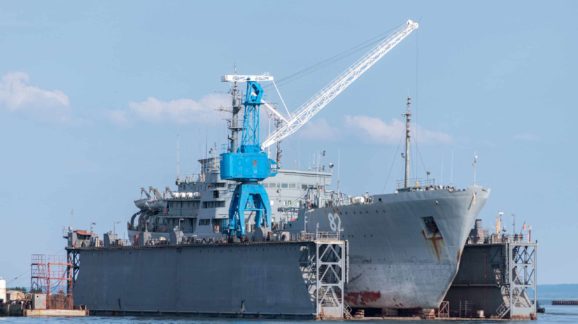

The COVID-19 pandemic has triggered the worst economic crisis since the Great Depression. Tens of millions have lost their jobs. Unleashing the innovation and productivity of American workers has become more urgent than ever. Americans cannot afford government programs that set everyone back for the benefit of well-connected special interests. One such program—the Jones Act—is particularly hard to justify. Its purpose is protectionist, but it is so poorly designed that it favors foreign sellers over American ones.
The Jones Act requires any ship traveling between two U.S. points to be U.S.-manufactured, -owned, -flagged, and -crewed.[1] This heavy-handed protectionist measure was enacted in 1920 with the stated purpose of ensuring a strong merchant marine to support America’s commerce and the nation’s preparedness for war and national emergency. A century later, the evidence is clear. For 100 years the law has not only failed to accomplish any of its stated objectives, it has systematically undermined all of them, and continues to do so today. The law has succeeded mostly in putting most of America’s maritime industry out of business, while making it pointlessly difficult for Americans to buy American.
Particularly with respect to maritime transport, the Jones Act has proven a counterproductive and costly failure. Its flaws are an inevitable result of its cartel structure. It undermines its stated purposes: a strong merchant marine, support for America’s commerce, and support for the nation’s preparedness for war and national emergency. Its effects on the energy sector and on Puerto Rico are particularly severe and indefensible, to name just two special cases. A number of promising reforms have been proposed, but the Jones Act lobby continues to block them all.
Consequences of Cartel Structure. The Jones Act is a classic government-created cartel, which entails reduced output, reduced competitiveness, reduced innovation, and higher prices for the shipbuilding industry, shipping services, and all who rely on them.
The law’s supporters argue that because its costs are difficult to quantify, it is not clear that it costs anything. This is highly misleading. The law is designed precisely to restrict the supply of domestic shipping so that American shippers can charge higher prices.
Consequences for the U.S. Shipbuilding Industry. Today the Jones Act mostly covers about 30,000 tugs and barges plying America’s inland waterways, and its punitive restrictions mainly benefit railways and trucking companies. As for America’s once mighty oceangoing merchant marine, the law has protected it to death. Barely 99 oceangoing vessels remain in the Jones Act fleet, half of which serve Alaska on routes that are themselves protected from competition by other laws.[2]
To understand how self-destructive the Jones Act has been, imagine that all the parts in an American car or smartphone had to be made in America. A Ford would cost more than a Mercedes. An iPhone would cost as much as a car. Nobody in the world would want one.
That is what has happened to the U.S. shipbuilding industry. Under the law’s supposed protection, the number of U.S. commercial shipyards has dwindled from 64 after World War II to barely one, Philly Shipyards, a subsidiary of a Norwegian company that uses South Korean designs and engines. It currently has no shipbuilding orders, and has begun to compete for Defense Department maintenance and repair contracts. Meanwhile, whole categories of ships, such as heavy lift, liquified natural-gas transport, and offshore construction vessels, are no longer made in the U.S. because of the Jones Act.[3] Any American who needs to use such a ship domestically must lobby Congress for a statutory exemption.
Consequences for U.S. Commerce. The Jones Act’s proponents are fervent supporters of “buy American” but the law unintentionally favors foreign sellers over domestic ones. It is protectionism for foreign companies. Shipping rates on Jones Act routes are typically several times more expensive than rates in the competitive international market, especially in terms of cost per nautical mile travelled for a standard container. This is because federal law makes it almost three times more expensive to operate a ship domestically than internationally. The same shipping companies that charge nearly $3,000 to ship a container from Jacksonville to Puerto Rico charge half as much to ship that same container to nearby Dominican Republic.[4]
Consequences for National Security and Emergency Preparedness. The law has also failed its national security mission. The Defense Department prefers foreign transport ships because of their much lower cost, and the vast majority of the vessels chartered for sealift during the Gulf and Iraq Wars was foreign.[5] Even if U.S. commercial ships were affordable and available for military use, their military utility is fading fast: 21 st century warfare requires transport ships that are fast and flexible, while the global maritime industry is heading in the other direction, with transport ships that are increasingly slower, bigger, and less maneuverable. As for national emergencies, every time one requires sealift the Jones Act needs to be waived so victims can get the relief they need from ships that are actually available.
Consequences for the U.S. Energy Sector. The impact of the Jones Act on American energy is particularly difficult to justify in today’s world of globally dominant North American oil production and falling prices. East Coast refineries are forced to import oil and gas from foreign countries while America’s own Gulf Coast suppliers drown in an ocean of cheap oil and gas, desperate for markets.[6] If it not for the Jones Act, America might be able to cut its imports of crude oil by half.
Consequences for Puerto Rico. According to one study, the Jones Act is equivalent to a 64.6 percent tariff on domestic seaborne trade.[7] Puerto Rico, Hawaii, and Alaska can import whatever they want from America’s trading partners virtually tariff-free—but if they import anything from the mainland United States, they must pay a significant penalty. In some cases, the penalty is prohibitive: Puerto Rico is forced to get its energy from countries like Venezuela and Trinidad instead of from the United States.
Recommendations. If reviving America’s shipbuilding and shipping industries ever became a national priority, the Jones Act would have to be repealed in its entirety. In the meantime, several reforms can be undertaken, including:
For 100 years, the Jones Act has poisoned America’s maritime industry while imposing hidden costs on U.S. consumers. Its chief beneficiaries are foreign shippers whom the law in effect protects from American competition. Its only American beneficiaries are a small number of decrepit shipyards and shipping companies that depend entirely on the slow poison of its cartel restrictions, and the government officials who find short-term political benefit in subordinating the public interest to those special interests.
Notes
[2] U.S. Maritime Administration, “Summary Tables: United States Flag Privately-Owned Merchant Fleet, 2000–2019: Oceangoing Self-Propelled, Cargo-Carrying Vessels of 1,000 Gross Tons and Above,” https://www.maritime.dot.gov/sites/marad.dot.gov/files/oictures/US-fleet%20Summary%20Table-2000-2019.pdf
[3] John Frittelli, “Shipping Under the Jones Act: Legislative and Regulatory Background,” CRS Report R45725, Congressional Research Service, May 17, 2019, https://fas.org/sgp/crs/misc/R45725.pdf.
[5] Government Accountability Office, “Strategic Sealift: Part of the National Defense Reserve Fleet Is No Longer Needed,” GAO/NSIAD, October 1991, p. 16, https://www.gao.gov/assets/160/151128.pdf. “MSC 2003 in Review: Commander’s Perspective,” U.S. Navy, Maritime Sealift Command, https://www.msc.navy.mil/annualreport/2003/perspective.htm.
[6] Energy Information Administration, Petroleum and Other Liquids, Weekly East Coast (PADD 1) Refiner Net Input of Crude Oil, Historical, https://www.eia.gov/dnav/pet/hist/LeafHandler.ashx?n=PET&s=WCRRIP12&f=W.
[7] “The Economic Effects of Significant U.S. Import Restraints,” U.S. International Trade Commission, May 1999, p. 98, https://www.usitc.gov/publications/332/pub3201.pdf.

Politics ruins everything. Right now, it is ruining America’s steel industry. The Biden administration, with plenty of bipartisan support, has announced it will block…
The American Institute for Economic Research
“The Old Lady of Threadneedle Street” is the affectionate nickname of the Bank of England, as respected an institution as Britain ever had. Calling something…
It’s a divisive election year, but all of us still have some things in common. Since the pandemic began, inflation has devalued the dollar by…